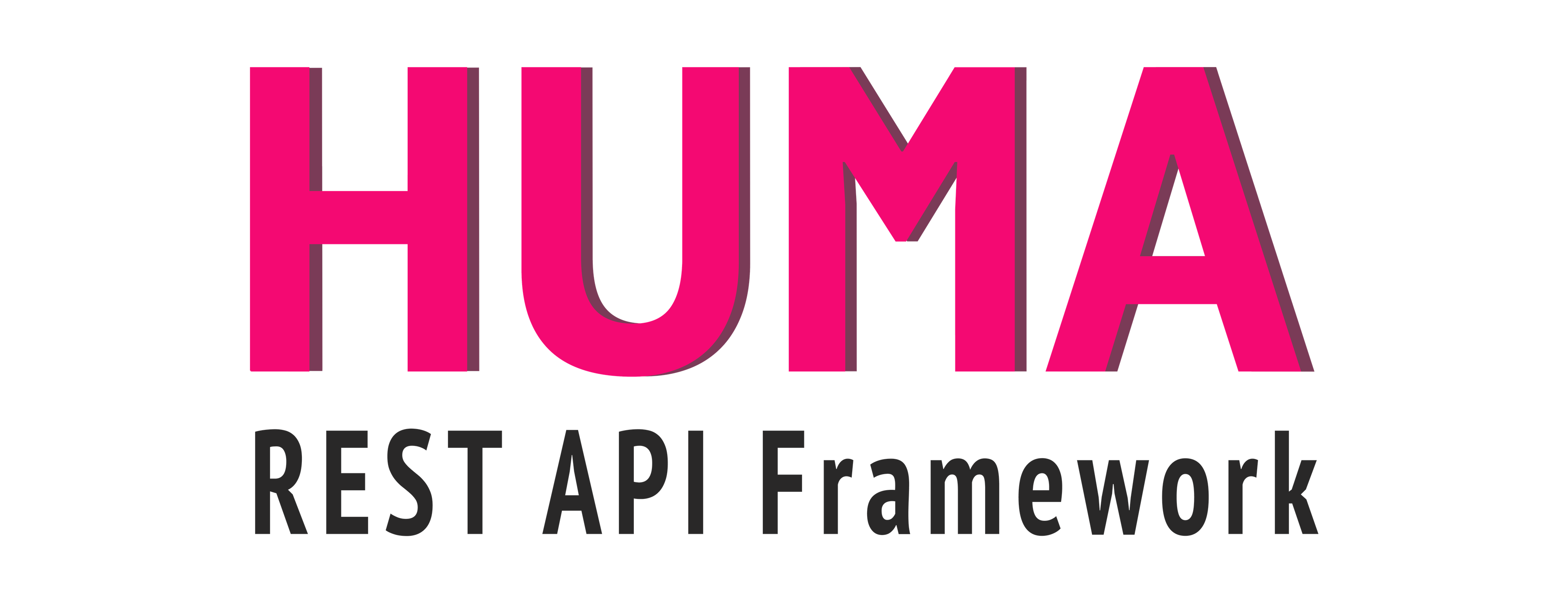
A modern, simple, fast & flexible micro framework for building HTTP REST/RPC APIs in Go backed by OpenAPI 3 and JSON Schema. Pronounced IPA: /'hjuːmɑ/. The goals of this project are to provide:
- Incremental adoption for teams with existing services
- Bring your own router (including Go 1.22+), middleware, and logging/metrics
- Extensible OpenAPI & JSON Schema layer to document existing routes
- A modern REST or HTTP RPC API backend framework for Go developers
- Described by OpenAPI 3.1 & JSON Schema
- Guard rails to prevent common mistakes
- Documentation that can't get out of date
- High-quality generated developer tooling
Features include:
- Declarative interface on top of your router of choice:
- Operation & model documentation
- Request params (path, query, header, or cookie)
- Request body
- Responses (including errors)
- Response headers
- JSON Errors using RFC9457 and
application/problem+jsonby default (but can be changed) - Per-operation request size limits with sane defaults
- Content negotiation between server and client
- Conditional requests support, e.g.
If-MatchorIf-Unmodified-Sinceheader utilities. - Optional automatic generation of
PATCHoperations that support: - Annotated Go types for input and output models
- Generates JSON Schema from Go types
- Static typing for path/query/header params, bodies, response headers, etc.
- Automatic input model validation & error handling
- Documentation generation using Stoplight Elements
- Optional CLI built-in, configured via arguments or environment variables
- Set via e.g.
-p 8000,--port=8000, orSERVICE_PORT=8000 - Startup actions & graceful shutdown built-in
- Set via e.g.
- Generates OpenAPI for access to a rich ecosystem of tools
- Mocks with API Sprout or Prism
- SDKs with OpenAPI Generator or oapi-codegen
- CLI with Restish
- And plenty more
- Generates JSON Schema for each resource using optional
describedbylink relation headers as well as optional$schemaproperties in returned objects that integrate into editors for validation & completion.
This project was inspired by FastAPI. Logo & branding designed by Kari Taylor.
A big thank you to our current & former sponsors:
This is by far my favorite web framework for Go. It is inspired by FastAPI, which is also amazing, and conforms to many RFCs for common web things ... I really like the feature set, the fact that it [can use] Chi, and the fact that it is still somehow relatively simple to use. I've tried other frameworks and they do not spark joy for me. - Jeb_Jenky
After working with #Golang for over a year, I stumbled upon Huma, the #FastAPI-inspired web framework. It’s the Christmas miracle I’ve been hoping for! This framework has everything! - Hana Mohan
I love Huma. Thank you, sincerely, for this awesome package. I’ve been using it for some time now and it’s been great! - plscott
Thank you Daniel for Huma. Superbly useful project and saves us a lot of time and hassle thanks to the OpenAPI gen — similar to FastAPI in Python. - WolvesOfAllStreets
Huma is wonderful, I've started working with it recently, and it's a pleasure, so thank you very much for your efforts 🙏 - callmemicah
Install via go get. Note that Go 1.20 or newer is required.
# After: go mod init ...
go get -u github.com/danielgtaylor/huma/v2Here is a complete basic hello world example in Huma, that shows how to initialize a Huma app complete with CLI, declare a resource operation, and define its handler function.
package main
import (
"context"
"fmt"
"net/http"
"github.com/danielgtaylor/huma/v2"
"github.com/danielgtaylor/huma/v2/adapters/humachi"
"github.com/danielgtaylor/huma/v2/humacli"
"github.com/go-chi/chi/v5"
)
// Options for the CLI. Pass `--port` or set the `SERVICE_PORT` env var.
type Options struct {
Port int `help:"Port to listen on" short:"p" default:"8888"`
}
// GreetingOutput represents the greeting operation response.
type GreetingOutput struct {
Body struct {
Message string `json:"message" example:"Hello, world!" doc:"Greeting message"`
}
}
func main() {
// Create a CLI app which takes a port option.
cli := humacli.New(func(hooks humacli.Hooks, options *Options) {
// Create a new router & API
router := chi.NewMux()
api := humachi.New(router, huma.DefaultConfig("My API", "1.0.0"))
// Add the operation handler to the API.
huma.Get(api, "/greeting/{name}", func(ctx context.Context, input *struct{
Name string `path:"name" maxLength:"30" example:"world" doc:"Name to greet"`
}) (*GreetingOutput, error) {
resp := &GreetingOutput{}
resp.Body.Message = fmt.Sprintf("Hello, %s!", input.Name)
return resp, nil
})
// Tell the CLI how to start your router.
hooks.OnStart(func() {
http.ListenAndServe(fmt.Sprintf(":%d", options.Port), router)
})
})
// Run the CLI. When passed no commands, it starts the server.
cli.Run()
}Tip
Replace chi.NewMux() → http.NewServeMux() and humachi.New → humago.New to use the standard library router from Go 1.22+. Just make sure your go.mod has go 1.22 or newer listed in it. Everything else stays the same! Switch whenever you are ready.
You can test it with go run greet.go (optionally pass --port to change the default) and make a sample request using Restish (or curl):
# Get the message from the server
$ restish :8888/greeting/world
HTTP/1.1 200 OK
...
{
$schema: "http://localhost:8888/schemas/GreetingOutputBody.json",
message: "Hello, world!"
}Even though the example is tiny you can also see some generated documentation at http://localhost:8888/docs. The generated OpenAPI is available at http://localhost:8888/openapi.json or http://localhost:8888/openapi.yaml.
Check out the Huma tutorial for a step-by-step guide to get started.
See the https://huma.rocks/ website for full documentation in a presentation that's easier to navigate and search then this README. You can find the source for the site in the docs directory of this repo.
Official Go package documentation can always be found at https://pkg.go.dev/github.com/danielgtaylor/huma/v2.
- APIs in Go with Huma 2.0
- Reducing Go Dependencies: A case study of dependency reduction in Huma
- Golang News & Libs & Jobs shared on Twitter/X
- Featured in Go Weekly #495 & #498
- Bump.sh Deploying Docs from Huma
- Mentioned in Composable HTTP Handlers Using Generics
Be sure to star the project if you find it useful!
